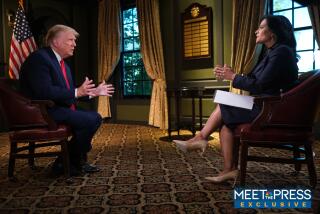Networks lavish Obama with airtime and criticism
- Share via
It seems like just about everybody has spent the last week beating up on the media for showering too much love on Barack Obama, during what John McCain’s camp derides as the Obama World Tour.
True, statistics show broadcast networks have devoted more than twice as much airtime in recent weeks to the Democrat than to the Republican.
But don’t assume that more coverage is always good coverage. Reports from the Mideast and back home in recent days have revealed that reporters were determined not to cut Obama any slack.
That’s only right. Obama has received breathless, man-of-the moment coverage. Now, he has to expect the tough questions that confront any presidential candidate. But even as the media moves to correct itself, it’s entering a period of shallow analysis.
It was totally in bounds, and expected, when CBS anchor Katie Couric bore down on Obama on Tuesday night during their interview in Jordan -- demanding to know why the candidate still wouldn’t concede that the military surge had helped reduce violence in Iraq.
Obama responded that no one could be certain what would have happened without the troop buildup. He also acknowledged that “the extraordinary work of our U.S. forces has contributed to a lessening of the violence.”
Indeed, Obama does appear loath to admit the surge has helped. And, ironically, the relative calm has made his 16-month withdrawal timeline more plausible to many, including the Iraqi government.
That’s Obama’s mistake -- missing the opportunity to show he recognizes changing circumstances and to prove himself a pragmatist, not an ideologue.
But while Obama mistakenly slights the surge, credit isn’t coming his way for describing complexities on the ground that some critics refuse to see.
At CNN, the ever-windy Lou Dobbs sputtered in outrage that Obama was in denial. And the Fox News commentariat slapped the Democrat around as out of touch with reality.
But those television critics, like McCain, sought to turn Iraq into a one-dimensional battleground dominated by a single factor -- the American military.
George Packer, a writer who has spent as much time learning about the reality in Iraq as these commentators spend misreporting it, also criticizes Obama for failing to acknowledge the surge.
But Packer, author of the acclaimed “The Assassins’ Gate,” also offers the sort of nuanced assessment that is too often absent from the Iraq debate.
“The improved conditions can be attributed, in increasing order of importance,” Packer wrote in the New Yorker earlier this month, “to President Bush’s surge, the change in military strategy under Gen. David Petraeus, the turning of Sunni tribes against Al Qaeda, the Sadr militia’s unilateral cease-fire, and the great historical luck that brought them all together at the same moment.”
Packer added another inconvenient truth. “These developments may be temporary or cyclical; predicting the future in Iraq has been a losing game,” he wrote.
Indeed, in Couric’s equal-time interview Tuesday night, she pressed McCain about the other factors contributing to Iraq’s stability. In return, she got the Arizona senator’s “surge is working” mantra and his misstatement about the start of the so-called Sunni uprising.
Rather than give full credit to the Iraqis, McCain insisted that the U.S. military paved the way for local sheiks to turn against Al Qaeda -- a twist of the facts that is at least as disingenuous as Obama’s downplaying of the surge.
Contemporaneous reports from the American military and independent reporters had the Sunnis rising against terrorism before they received much-needed backup from the U.S.
Reporters questioned McCain’s misstep, but the moment requires something deeper than another ‘gotcha.’ How about insisting that McCain address the complex reasons behind Iraq’s retreat from chaos?
For now, cable television’s talking heads are too fixated on ruminations about Obama’s presidential timbre.
They spent days before the semisecret trip to the war zone insisting that the 46-year-old prove his gravitas. They said he had to appear presidential on the world stage.
So what did Obama do? He waded in. Soldiers, diplomats and heads of state greeted him warmly, even effusively. He seemed self-assured. He nailed the now-storied basketball shot, rode alone with King Abdullah in his royal Mercedes and committed no major gaffes.
Wouldn’t you know it, after all that, Obama is now taking a hiding for acting too presidential.
Reporters on his plane insisted Tuesday that his advisors brief them on his dinner with the Jordanian king on the record. When Obama’s staff said that presidential staffers typically gave such reports anonymously, the traveling press rebelled, reminding the hirelings that the Illinois senator remained 270 electoral votes short of that privilege.
But when Obama spoke openly about his private meeting with Iraqi leader Nouri Maliki, CNN’s Gloria Borger bashed him from the other side. Borger said Obama had “crossed the line” and played like he was in charge. The cable network’s Dobbs huffily reminded the senator that he had “not quite yet been elected.”
Yes, Obama has won the extended airplay and the kind of command-moment video that any presidential candidate would crave. But the soundtrack from the media? It’s spotty and a bit off track.
--
More to Read
The biggest entertainment stories
Get our big stories about Hollywood, film, television, music, arts, culture and more right in your inbox as soon as they publish.
You may occasionally receive promotional content from the Los Angeles Times.











